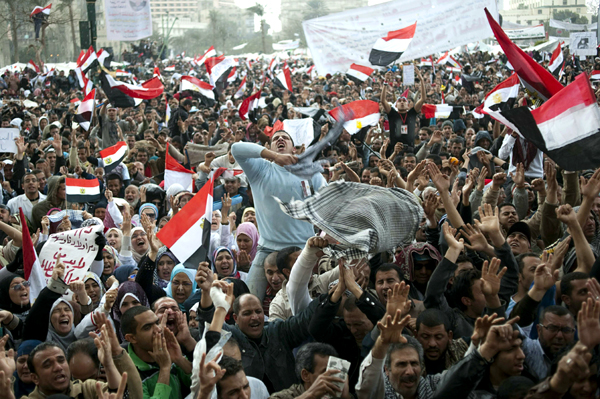
The anger and courage of the Egyptian protesters has won a great victory in forcing former President Mubarak to resign on 11 February after 18 days of continuous struggle on Maidan Al Tahrir, Cairo (Liberation Square) and in cities across the country. Egyptian protesters in their millions were unwavering in their determination to remove Mubarak. They refused to be fooled or to be threatened by the President, his newly-appointed Vice President, the armed forces or thugs unleashed on the streets – instead the mobilisations increased to such a scale that they threatened even the viability of the army, forcing the Egyptian military high command and the US government to tell Mubarak he had to go.
After the protesters declared that 4 February was to be the Day of Departure, government-paid forces tried to disperse them by violence. On 2 February protesters were attacked, including with live ammunition, resulting in 1,500 people injured and three deaths, but the attackers were repulsed and defeated. According to Human Rights Watch, at least 302 people have been killed in Egypt since 25 January 2011 (in Cairo, Alexandria, and Suez).
The revolution was carried out by men, women, youth, elderly, children, middle class and working class people, secular and religious groups, both Christian and Muslim. According to Egyptian state television over 23,000 prisoners escaped and fewer than half have been recaptured. Many have told of being tortured by Egyptian military personnel.
After President Mubarak announced his resignation protesters celebrated what they have achieved so far. They have said they will fight for more rights and the lifting of the Emergency Law that allows the state to make arbitrary arrests and place people in indefinite detention. On 12 February the now ruling Armed Forces command issued a statement saying that Egypt is committed to all its regional and international agreements. Although there was no direct reference to the peace treaty with Israel, this statement assures the imperialists and Zionists that the new government will continue its role of backing the Israeli state.
The army generals now in command repeatedly tell people to return to normal, to ensure stability and so on, but a wave of strikes has swept across Egypt. The revolt is at a crossroads, its core must consolidate for battles ahead and to prevent the military and security police launching counter-revolution and terror against the movement that has been built. Protesters in Egypt have called for a new march this coming Friday and called it the Victory March!




